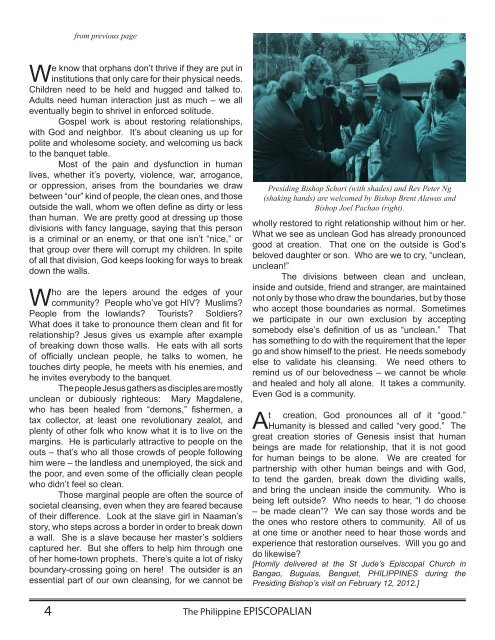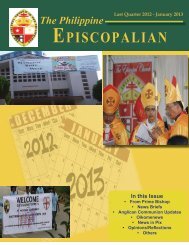read issue - Episcopal Church in the Philippines
read issue - Episcopal Church in the Philippines
read issue - Episcopal Church in the Philippines
You also want an ePaper? Increase the reach of your titles
YUMPU automatically turns print PDFs into web optimized ePapers that Google loves.
4<br />
from previous page<br />
We know that orphans don’t thrive if <strong>the</strong>y are put <strong>in</strong><br />
<strong>in</strong>stitutions that only care for <strong>the</strong>ir physical needs.<br />
Children need to be held and hugged and talked to.<br />
Adults need human <strong>in</strong>teraction just as much – we all<br />
eventually beg<strong>in</strong> to shrivel <strong>in</strong> enforced solitude.<br />
Gospel work is about restor<strong>in</strong>g relationships,<br />
with God and neighbor. It’s about clean<strong>in</strong>g us up for<br />
polite and wholesome society, and welcom<strong>in</strong>g us back<br />
to <strong>the</strong> banquet table.<br />
Most of <strong>the</strong> pa<strong>in</strong> and dysfunction <strong>in</strong> human<br />
lives, whe<strong>the</strong>r it’s poverty, violence, war, arrogance,<br />
or oppression, arises from <strong>the</strong> boundaries we draw<br />
between “our” k<strong>in</strong>d of people, <strong>the</strong> clean ones, and those<br />
outside <strong>the</strong> wall, whom we often def<strong>in</strong>e as dirty or less<br />
than human. We are pretty good at dress<strong>in</strong>g up those<br />
divisions with fancy language, say<strong>in</strong>g that this person<br />
is a crim<strong>in</strong>al or an enemy, or that one isn’t “nice,” or<br />
that group over <strong>the</strong>re will corrupt my children. In spite<br />
of all that division, God keeps look<strong>in</strong>g for ways to break<br />
down <strong>the</strong> walls.<br />
Who are <strong>the</strong> lepers around <strong>the</strong> edges of your<br />
community? People who’ve got HIV? Muslims?<br />
People from <strong>the</strong> lowlands? Tourists? Soldiers?<br />
What does it take to pronounce <strong>the</strong>m clean and fit for<br />
relationship? Jesus gives us example after example<br />
of break<strong>in</strong>g down those walls. He eats with all sorts<br />
of officially unclean people, he talks to women, he<br />
touches dirty people, he meets with his enemies, and<br />
he <strong>in</strong>vites everybody to <strong>the</strong> banquet.<br />
The people Jesus ga<strong>the</strong>rs as disciples are mostly<br />
unclean or dubiously righteous: Mary Magdalene,<br />
who has been healed from “demons,” fishermen, a<br />
tax collector, at least one revolutionary zealot, and<br />
plenty of o<strong>the</strong>r folk who know what it is to live on <strong>the</strong><br />
marg<strong>in</strong>s. He is particularly attractive to people on <strong>the</strong><br />
outs – that’s who all those crowds of people follow<strong>in</strong>g<br />
him were – <strong>the</strong> landless and unemployed, <strong>the</strong> sick and<br />
<strong>the</strong> poor, and even some of <strong>the</strong> officially clean people<br />
who didn’t feel so clean.<br />
Those marg<strong>in</strong>al people are often <strong>the</strong> source of<br />
societal cleans<strong>in</strong>g, even when <strong>the</strong>y are feared because<br />
of <strong>the</strong>ir difference. Look at <strong>the</strong> slave girl <strong>in</strong> Naaman’s<br />
story, who steps across a border <strong>in</strong> order to break down<br />
a wall. She is a slave because her master’s soldiers<br />
captured her. But she offers to help him through one<br />
of her home-town prophets. There’s quite a lot of risky<br />
boundary-cross<strong>in</strong>g go<strong>in</strong>g on here! The outsider is an<br />
essential part of our own cleans<strong>in</strong>g, for we cannot be<br />
The Philipp<strong>in</strong>e EPISCOPALIAN<br />
Presid<strong>in</strong>g Bishop Schori (with shades) and Rev Peter Ng<br />
(shak<strong>in</strong>g hands) are welcomed by Bishop Brent Alawas and<br />
Bishop Joel Pachao (right).<br />
wholly restored to right relationship without him or her.<br />
What we see as unclean God has al<strong>read</strong>y pronounced<br />
good at creation. That one on <strong>the</strong> outside is God’s<br />
beloved daughter or son. Who are we to cry, “unclean,<br />
unclean!”<br />
The divisions between clean and unclean,<br />
<strong>in</strong>side and outside, friend and stranger, are ma<strong>in</strong>ta<strong>in</strong>ed<br />
not only by those who draw <strong>the</strong> boundaries, but by those<br />
who accept those boundaries as normal. Sometimes<br />
we participate <strong>in</strong> our own exclusion by accept<strong>in</strong>g<br />
somebody else’s def<strong>in</strong>ition of us as “unclean.” That<br />
has someth<strong>in</strong>g to do with <strong>the</strong> requirement that <strong>the</strong> leper<br />
go and show himself to <strong>the</strong> priest. He needs somebody<br />
else to validate his cleans<strong>in</strong>g. We need o<strong>the</strong>rs to<br />
rem<strong>in</strong>d us of our belovedness – we cannot be whole<br />
and healed and holy all alone. It takes a community.<br />
Even God is a community.<br />
A t creation, God pronounces all of it “good.”<br />
Humanity is blessed and called “very good.” The<br />
great creation stories of Genesis <strong>in</strong>sist that human<br />
be<strong>in</strong>gs are made for relationship, that it is not good<br />
for human be<strong>in</strong>gs to be alone. We are created for<br />
partnership with o<strong>the</strong>r human be<strong>in</strong>gs and with God,<br />
to tend <strong>the</strong> garden, break down <strong>the</strong> divid<strong>in</strong>g walls,<br />
and br<strong>in</strong>g <strong>the</strong> unclean <strong>in</strong>side <strong>the</strong> community. Who is<br />
be<strong>in</strong>g left outside? Who needs to hear, “I do choose<br />
– be made clean”? We can say those words and be<br />
<strong>the</strong> ones who restore o<strong>the</strong>rs to community. All of us<br />
at one time or ano<strong>the</strong>r need to hear those words and<br />
experience that restoration ourselves. Will you go and<br />
do likewise?<br />
[Homily delivered at <strong>the</strong> St Jude’s <strong>Episcopal</strong> <strong>Church</strong> <strong>in</strong><br />
Bangao, Buguias, Benguet, PHILIPPINES dur<strong>in</strong>g <strong>the</strong><br />
Presid<strong>in</strong>g Bishop’s visit on February 12, 2012.]




